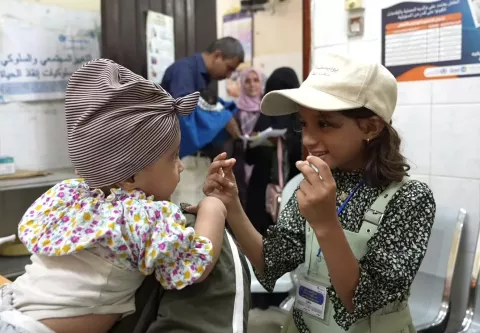"Please stop this war": Yemeni children hope for end to conflict
By Mohammed Al-Asaadi and Ansar Rasheed
Fighting in Yemen has closed numerous schools and left children in a desperate struggle to survive. Without emergency relief and an end to the conflict, their situation will only become worse.
SANA’A, Yemen, 5 May 2015 – Seven-year-old Nada Nussir will not be going to school tomorrow. Or the day after. Or the day after that.
And her 4-year old friend, Abdul Rahman, will never return to school at all.
“Abdul was 4 years old, and he was killed by a sniper,” Nada says. “I do not want to die like him.”
The pale, grey building of Ibn Sina School in Sana’a stood tall until few days ago, when an air strike hit the building next to the school. The impact of the blast crumbled the outer wall of the schoolyard and left classrooms covered in rubble and broken glass. The school, where 1,500 girls studied in primary and secondary classes, is closed indefinitely.
Conflict in Yemen has left many schools closed and nearly 2 million children unable to attend classes. UNICEF has verified that at least 30 schools have been damaged by fighting, exacerbating an already dire situation.
Even before the recent conflict, 1.6 million children were already out of school.
Many children can be seen with serious injuries, missing arms or legs – innocent, unsuspecting children who were caught unaware by explosions, shrapnel or ricocheting bullets.
Thanks in part to UNICEF campaigns to sensitize children and parents on the dangers of handling unexploded ordnance, Nada and her friends now tread with caution and avoid anything that looks dangerous.
Nevertheless, the need for greater public awareness only increases as the conflict deepens and expands to new areas.
Lives at risk
While Nada’s tragedy is reflected in much of the country’s new reality, another worrisome consequence grips the young boys of Yemen. Factions fighting on the ground recruit children as young as 6, turning them into either casualties or killers. Fearless boys who used to play football in the streets have now turned into combatants. Some are coerced into fighting; others are driven by social, economic, political or religious motives to take up guns. Sometimes it is a complex combination of all these, but the end result is the same in any case: The child’s life is put at risk.
In the southern city of Aden, 13-year-old Nesmah reflects painfully as she looks at the ruins of the ongoing fighting in her area.
“I am very sad,” she says. “The main road, the most beautiful area in our city, is demolished. The shop I used to buy school stationary from is burnt by rockets, and houses are destroyed. Buildings are empty. Ruins are all over. Please stop this war.”
With street fighting, canon shelling, snipers and aerial bombardments now happening every day, life for children like Nesmah and Nada has come to resemble an apocalyptic film.
The horror stories are easy to find in most parts of the country, where families, many of them displaced, can barely cope with the astronomical prices for basic amenities like food and fresh water, and the long queues to purchase a few litres of fuel, if they’re lucky.
If humanitarian relief doesn’t reach these children soon, the stories of Nada and Nesmah will have many tellers and many more takers, but very few actors remaining to play their parts.
For today, these children stand scarred but resolute. They wait wearily in their dilapidated neighbourhoods, hoping to emerge from the rubble and return to their schools once again – once the fighting ends.
Media contacts
About UNICEF
UNICEF promotes the rights and wellbeing of every child, in everything we do. Together with our partners, we work in 190 countries and territories to translate that commitment into practical action, focusing special effort on reaching the most vulnerable and excluded children, to the benefit of all children, everywhere.
For more information about UNICEF and its work for children, visit www.unicef.org.



